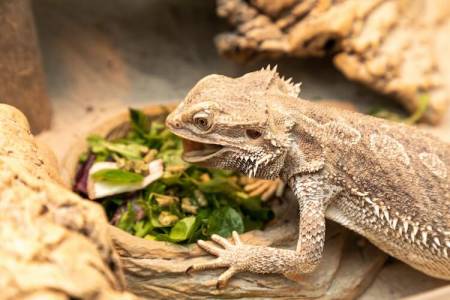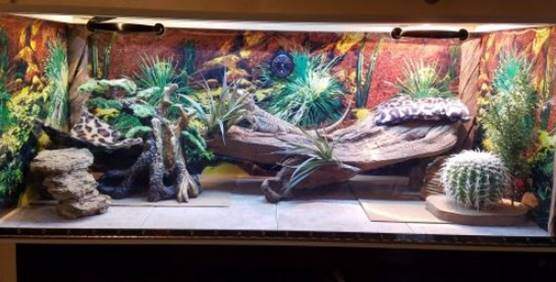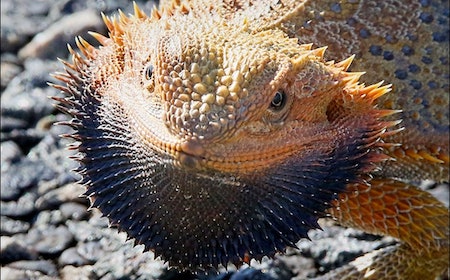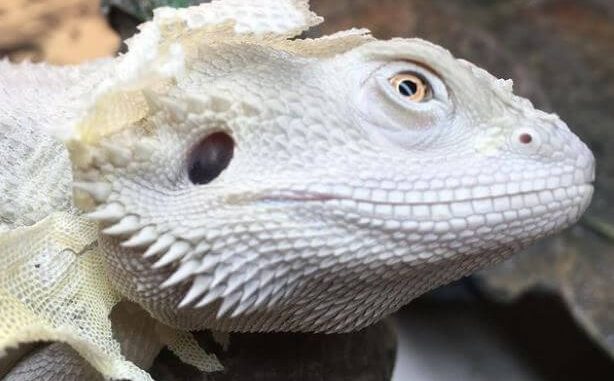Connect with a verified veterinarian in minutes. Licensed vets are available 24/7 to answer your questions. No need to worry about your furry family member.
Sometimes it can be confusing about what our bearded dragons can eat or not. They can eat veggies, but what about cucumbers? If you’re wondering about whether or not your beardie can eat cucumbers, you’re in the right place.
We’ll take a look at whether cucumbers are safe for your bearded dragon, how to fix a cucumber for your lizard, and more. Let’s get started!
Are Cucumbers Safe for Bearded Dragons to Eat?
Humans enjoy cucumbers immensely! It’s a popular fruit (yes—it’s really a fruit) that’s often included in salads and other dishes. However, is this a veggie that’s safe for your bearded dragon? The answer is yes! Cucumbers are safe for dragons; however, these are veggies that should only be served about every other week.
The reason is that cucumbers can cause some health problems if your dragon eats too many of them. Even so, these vegetables are packed with some of the nutrients your beardie needs, including:
- 96% water: making this an excellent way to hydrate your dragon, especially if he’s dehydrated.
- Protein: 0.65g
- Fat: 0.037g
- Fiber: 0.5g: helps to keep your beardie from becoming constipated.
- Vitamin C: 2.8mGrams: boots your dragon’s immune system, improves vision and helps him grow.
- Vitamin K: helps regulate blood clotting.
- Calcium: 16mGrams
- Phosphorus: 24mGrams
- Potassium: 146mGrams: works to help muscle function, prevent kidney issues, and helps lower water retention.
- Manganese: helps with metabolism and fights inflammation.
- Magnesium: promotes a healthy brain and healthy muscles.
The Health Benefits of Cucumber
Cucumber is rich in nutrients that can be used to improve the health of your bearded dragon. The nutritional value of cucumber includes vitamins A, B1, B2, C, D and E as well as beta-carotene. Beta-carotene is a carotenoid that can be converted to vitamin A in the body. It also contains minerals such as potassium, calcium, iron, magnesium, and phosphorus.
Cucumber seeds are a rich source of calcium, potassium, magnesium, and phosphorus. The seed coats contain saponins which can be used to reduce the side effects of metabolic bone disease. This is because they are antifungal and antiviral agents. Cucumber peels and cucumber skin contain silica, which is an important nutrient for your baby bearded dragon.
The digestive tract of your bearded dragon is lined with a mucous membrane. The skin of your bearded dragon also has a mucous membrane. If you feed your bearded dragon fruit, it will be easier for them to digest and absorb the nutrients. Cucumber contains enzymes that help in the digestion of fruits and vegetables. This helps in the absorption of nutrients from food that they eat.
Cucumber is rich in nutrients that can be used to improve the health of your bearded dragon. There are a lot of benefits that you can gain from using cucumber as a part of your dragon’s diet. Here are some of the health benefits that you can get from using cucumber for your bearded dragon’s health:
Reduces Constipation: If your bearded dragon is suffering from constipation, then you should give him or her some cucumbers. Cucumbers are known to help in alleviating constipation and increase intestinal movement in reptiles.
Reduces Arthritis Pain: Cucumbers are known to have anti-inflammatory properties which can help reduce pain and inflammation caused by arthritis. If your bearded dragon has arthritis, then he or she will definitely benefit from eating this vegetable since it helps in relieving the pain.
Helps the Digestive System: Cucumbers are known to be a good source of fiber which helps in increasing the digestive process. If your bearded dragon has bacterial infections, then you should give him or her some cucumbers since it can help in healing them up.
Helps With Calcium Deficiency: Calcium is one of the main minerals that your bearded dragon needs in order to maintain their health. If your bearded dragon is suffering from calcium deficiency, then you should give him or her some cucumbers since it can help in replenishing the calcium that they have lost.
Helps Hydration: If your bearded dragon is suffering from dehydration, then you should give him or her some cucumbers. Cucumbers are known to help in increasing the hydration of your bearded dragon.

Review symptoms, medications & behavior to keep your pets healthy with a Vet Online in just minutes.
Ask a Vet Live NowDon’t Feed Cucumber Too Often
The reason that bearded dragons can’t have cucumbers too often is that they have a high water content. Remember that dragons are desert dwellers, which means they don’t require much water. Too much cucumber could cause your bearded dragon to develop diarrhea. So, it’s best not to feed your beardie this veggie/fruit too often.
In addition, cucumbers are not a good source of calcium. Dragons need calcium in order to keep their bones healthy. What’s more, cucumbers have a ratio of calcium to phosphorus which is too high. In cucumbers, this ratio is 1:15, which is too much (phosphorus is the larger number). The problem with phosphorus is that it binds with calcium, which keeps the calcium from entering the bloodstream of the lizard. This keeps valuable calcium from the lizard’s body, which can lead to metabolic bone disease.
You should only feed your beardie cucumber in small amounts about every other week. It’s a good idea to check with your vet on this, too.
How to Prepare Cucumbers for Your Bearded Dragon
Thankfully, you don’t have to fix cucumbers up in any special way for your beardie! It’s pretty simple to get cucumbers ready for him!
1). Wash the cucumbers before you peel them. This removes pesticides and dirt, which your lizard definitely doesn’t need!
2). Peel the cucumber because dragons can’t chew up the peel. It can also cause a gut obstruction if they swallow too much of the peel.
3). Cut the cucumber in half, lengthwise. Then scoop out the seeds, which could cause choking or a gut obstruction. Beardies should not eat seeds.
4). Cut the cucumber into small pieces that are the right size for your beardie. Make sure they’re not too big, as they could cause choking.
That’s it! Now the cucumber is ready to serve your bearded dragon!
What Else Can Bearded Dragons Eat?
Bearded dragons eat a wide variety of foods! They need a varied, balanced diet in order to stay healthy. In the wild, dragons eat 75% of insects and other small animals, and they eat about 20% to 25% of greens, veggies, and fruit for the rest of their diet.
Insects Safe for Bearded Dragons
Your beardie can eat the following insects:
- Crickets
- King worms
- Waxworms
- Earthworms
- Cockroaches
- Locusts
- Butterworms
- Silkworms
- Phoenix worms
- Crickets
- Dubia roaches
- Mealworms
- Superworms
Your beardie can safely eat these fruits:
- Figs
- Melon
- Apples
- Mango
- Papaya
- Dates
- Peaches
- Apricots
- Plums
- Kiwi
- Strawberries
- Guava
- Pears
- Grapes
- Raisins
Beardies can also eat these vegetables:
- Peas
- Green beans
- Courgette
- Butternut squash
- Sweet potato
- Bell pepper
- Ocra
- Broccoli
- Acorn squash
- Cabbage
- Kohlrabi
- Parsnip
- Bok choi
- Yellow squash
- Asparagus
Greens that are safe for a Bearded dragon include:
- Kale
- Collard greens
- Parsley
- Clover
- Dandelion greens
- Turnip greens
- Endive
- Mustard greens
- Rocket
- Coriander
Occasional foods safe for your dragon include:
- Tomatoes
- Blueberries
- Grated carrots
- Bananas
- Cucumber
Foods Not Safe for Bearded Dragons
There are some foods that are not safe for bearded dragons. These foods include:
- Iceberg lettuce
- Spinach
- Insects caught in the wild
- Fireflies
- Avocados
- Rhubarb
In addition, your beardie should not eat fish or any type of seafood.
Is there a Food That’s Best for Beardies?
Yes, there are foods that are best for bearded dragons. These include crickets and mealworms. These are easily found at pet shops, or you can even raise them at home.
In addition, it’s also a good idea to add some calcium and multi-vitamins to your dragon’s food. These are usually in powder form and can be dusted on the lizard’s live food before giving it to him.
What if Your Bearded Dragon Doesn’t Eat?
It can happen that your bearded dragon may not want to eat. This can happen for different reasons. For instance, if the temperature of your beardie’s habitat is too high or low, he may not want to eat. Another possible issue is gut impaction from eating too many insects with hard shells. Shedding can also take away your lizard’s appetite, as can stress or even parasites.
However, it may also mean that your dragon’s simply not hungry. He may have eaten more at his last feeding and just doesn’t have room for more food!
Dragons may also not be able to eat food that’s too large. For insects, they should be about the same size as the space between your bearded dragon’s eyes. Choking hazard is a major risk for pets. You should always remember to keep an eye on your dragon’s food and never leave it unattended.
If your bearded dragon doesn’t eat and you’ve checked everything above, then look for any signs of illness. This could include diarrhea, lack of energy, or even swollen eyes. If your beardie just doesn’t seem to want to eat and is showing any concerning symptoms, then it’s best to call the vet. Sometimes lizards become ill and need to see the vet to be treated.
Be sure to follow the vet’s advice when it comes to your dragon’s diet. They’ll have the best advice on what’s safe and good for your unique bearded dragon!
Connect with a verified veterinarian in minutes. Licensed vets are available 24/7 to answer your questions. No need to worry about your furry family member.

Julie
Julie is a graduate of the University of North Carolina, Wilmington, where she studied Animal science. Though contrary to the opinion of her parents she was meant to study pharmacy, but she was in love with animals especially cats. Julie currently works in an animal research institute (NGO) in California and loves spending quality time with her little cat. She has the passion for making research about animals, how they survive, their way of life among others and publishes it. Julie is also happily married with two kids.
Review symptoms, medications & behavior to keep your pets healthy with a Vet Online in just minutes.
Ask a Vet Live Now




